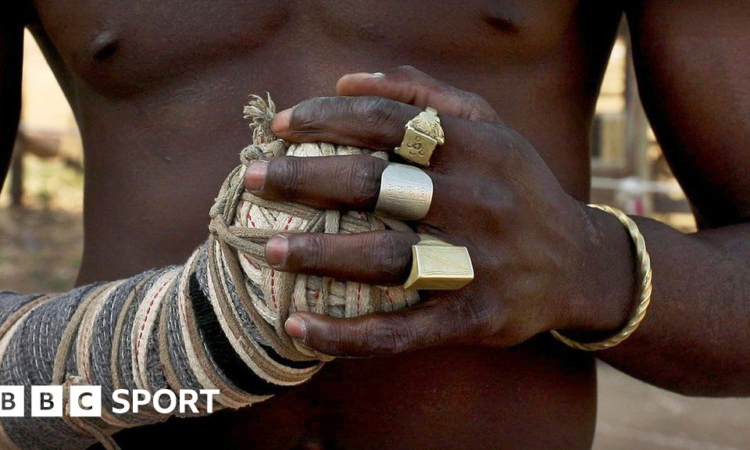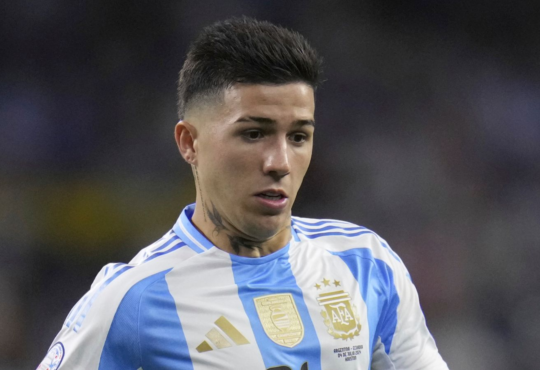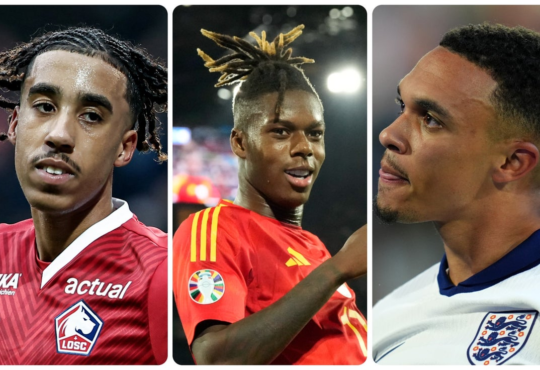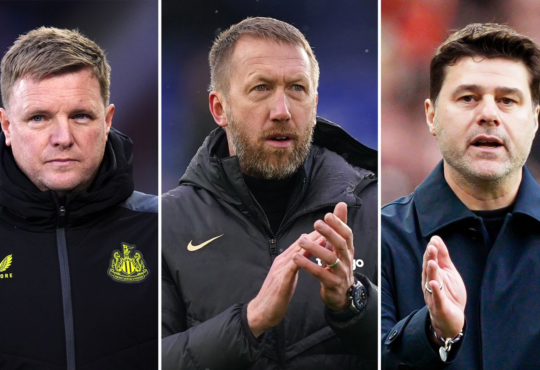
Dambe is a traditional sport in Hausa communities in northern Nigeria, but it is gaining popularity across the world through the internet
As the sun sets on Kano city a golden glow descends on Nigeria's second biggest metropolis.
The rhythmic beat of the Kalangu drums fills the sweltering air of the arena ahead of the final match of the first Emir Ado Bayero Dambe Championship.
Hundreds of loud supporters, many of them here since morning, have encircled the dusty ring.
They cheer the names of the two champions who have taken their places ready for the fight to begin.
"There is a certain beat that is played just for me before the match starts. This beat boosts my morale and gives me a lot of strength to fight well," Abdullahi Ali Ahmed, nicknamed Coronavirus, tells BBC Africa.
"The feeling of the beat is really intimidating but I put aside any sort of fear. I do not feel scared or tense."
The 21-year-old is about to face his opponent in a combat sport thought to have originated among the Hausa people over a thousand years ago.
"Dambe's history is in spear and shield warfare," Maxwell Kalu, the founder of African Warriors and organiser of the tournament, explains.
"It's how warriors used to prepare for battle."
Fighters wrap ropes around their punching hand, named 'the spear', and block oncoming blows with the other, referred to as the 'shield'.
The aim is 'to kill' – which for dambe means to knock out or knock down your adversary.
The day before his final match Coronavirus had started training early, executing a mix of shadowboxing, squats and heavy lifting within the ragged sand-tinted walls of a gym in the outskirts of Kano.
An old poster of American bodybuilder Ronnie Coleman displaying his sculpted body hangs on the wall.
He got his nickname, often shortened to Corona, from a bystander who remarked on how ferociously he fought during a trip to Abuja.
"We grew up hearing the word dambe because it is one of the traditional local games that we have," the fighter says.
"I started partaking in fights in my teenage days and gradually kept pushing myself towards it. I noticed that I started acing all my fights."
Abdullahi Ali Ahmed, nicknamed Coronavirus, binds his right hand and arm to create his 'spear'
In the past, some fighters used to embed glass shards in their 'spear' arm to maximise damage, but this practice is now outlawed.
"I'm not going to lie, I've seen some bad cuts, bruises and bloody noses in dambe," Kalu says.
In a push to make dambe safer and fairer, African Warriors has introduced a fresh set of rules, including three three-minute rounds (where before there were none) and a points system to score the style of fighting.
"We also properly articulated what it means to knock down your opponent," Kalu adds. "And made sure it's easier for a person to watch, and ultimately to keep the fighters safe."
Moreover, African Warriors says health personnel are always available to fighters at match sites.
The Nigerian combat sport with worldwide aspirations
Coronavirus knows the importance of staying safe.
For him and his family, dambe is not just a hobby. It is also a precious source of income.
"The type of injury I get is mostly scars… on the face, on the forehead. And some body pains," he says.
Watching her son prepare for the tournament, Khadija Ahmed nervously glides her fingers through her prayer beads. She is well aware of the risks involved.
"He has [had] a lot of strength in him ever since he was a child," she says.
"But he was a child with so much intelligence and had a fierce energy in him. I pray that the match starts and ends well, without him having any wounds, dislocation, fracture, or any other sort of injury."
His Highness the Emir Aminu Ado Bayero was in attendance at the Dorayi Palace in Kano for the dambe championship bearing his name
Dambe was traditionally practiced by butchers and tradesmen but it developed a social stigma because some Nigerian people looked down on these professions.
But the endorsement of the traditional leader of Nigeria's biggest state is a sign that attitudes towards the sport are changing.
"It's a necessary element in the tradition of Kano," says His Highness the Emir Aminu Ado Bayero, who claims he has supported the sport "right from time immemorial".
"As the custodian of culture and tradition, I look at dambe as a priority and will continue to support the game and make it more successful in the annals of our history," the royal added.
Thanks to online platforms, the sport has gained wider popularity among a global audience.
One of the most watched dambe fight videos on YouTube has clocked up more than 25 million views.
Meanwhile, one of the sponsors of the Ultimate Fighting Championship signed a contract with African Warriors earlier this year, citing what it sees as "huge potential for dambe".
"My hope is to give the fighters bigger opportunities and a big platform to perform," Kalu said.
"Apart from Nigeria, fans in the United States and Brazil are two big audiences that love what we do."
Coronavirus aims to use money he wins in dambe fights to invest in his future
Back at the arena, the Emir arrives in a teal blue Rolls Royce – the royal reportedly has a passion for vintage models and owns a collection of them.
Surrounded by an entourage dressed in full regalia, the Emir watches Coronavirus and his opponent Audun Tunga trading jabs.
The two fighters represent the House of Kuduawa and the House of Gurumada respectively, two of the three teams competing in the Championship.
"The loser will go back home on a bus carrying wood, the winner will fly in a plane!" the commentator shouts to the crowd. "All is for the blessing of the Emir!"
After three brutal rounds, a winner is declared.
The drums pick up the beat again and supporters cheer with excitement.
The referee raises Coronavirus' right hand to signal victory.
He has won the battle, but the rule system of dambe means the overall trophy will go to House of Arewa, who scored the most points during the two-day tournament.
"We get quite a few rewards after fighting," says Coronavirus.
He is awarded 150,000 Naira (about $190) for his fight – a sum around five times the monthly minimum salary in Nigeria.
"Sometimes we even get sprayed with money in front of the viewers," he adds.
Such financial rewards have made dambe increasingly attractive to foreign fighters, and a number have travelled from Mali, Burkina Faso, Cameroon and Niger, sometimes defying border closures imposed after military coups.
Coronavirus, meanwhile, will return home triumphant with the prize money which he says he will invest in his future.
"As much as I take fighting wholeheartedly as my profession, I ask for a better job and then I will retire from dambe. I am doing these fights only for a brief period."
Each dambe fighter at the Championship has their own ritual song played with traditional Kalangu drums
Coronavirus' mother, Khadija Ahmed, says she offers special prayers for the success of her son
The House of Arewa won the first Emir Ado Bayero Dambe Championship Cup
European reaction, quarter-final draws & Premier League build-up
Liverpool want to 'win every trophy' possible for Klopp
'We want to achieve more' – Villa enjoy night 'to remember'
Crazy urban myth or legitimate punk-pop conspiracy?
Comedian Joanne McNally investigates
Country To Country festival highlights
Featuring live sets, interviews and exclusive sessions from the biggest stars
Understanding the royal photo re-touch story
How a Mother’s Day social media post caused a royal public relations crisis
A remote love affair…
Stephen Fry narrates a musical romance between two young strangers
'A geography teacher' – BBC pundits on career swaps, Love Island & Strictly. Video
'Somebody help me' – the injury that shocked football
Save the Free Hit chip – fantasy football tips
'Unreal' – the best Premier League comeback win in 20 years
Ferguson and Redknapp celebrate Cheltenham winners
Great goals by Irish players in Premier League. Video
Dealing with tough times and dining with Haaland. Video
KC Current make history with bespoke women’s stadium
'No magic moments' – has Champions League become boring?
'We walked off like we had lost' – memories of England v France
Addicted and homeless – a wild ride from the streets to the elite
Join the BBC Sport WhatsApp channels
F1 Q&A: Your questions answered after Saudi Arabian GP
© 2024 BBC. The BBC is not responsible for the content of external sites. Read about our approach to external linking.






